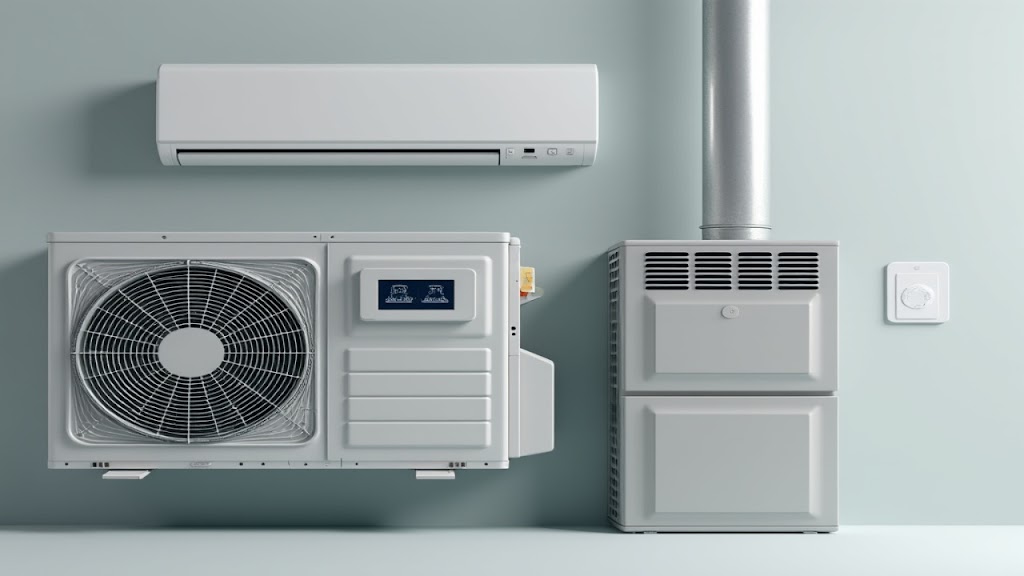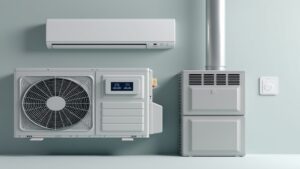When building or renovating your home, one crucial decision is selecting the right heating and cooling systems. These systems play a vital role in maintaining indoor comfort, energy efficiency, and overall home value. In this comprehensive guide, we’ll delve into the factors to consider when choosing a heating and cooling system, helping you make an informed decision that suits your needs and climate.
Understanding Your Heating and Cooling Needs
Assessing Your Home’s Requirements
Before choosing a heating and cooling system, it’s essential to assess your home’s specific needs. Consider factors such as the size of your home, insulation levels, and the climate in your region. Each home is unique, and a system that works well in one house may not be ideal for another.
- Size of Your Home: Larger homes typically require more powerful systems to ensure even heating and cooling. Conversely, smaller homes can often get by with less robust systems.
- Insulation Levels: Well-insulated homes retain heat and cool air better, which can influence the size and type of system you need.
- Climate: The local climate plays a significant role in determining the type of system that will be most efficient and effective.
Evaluating Different Heating Systems
There are several types of heating systems to choose from, each with its own advantages and considerations:
1. Forced Air Systems
Forced air systems, including furnaces, are popular for their ability to quickly heat up spaces. They work by blowing heated air through ducts into various rooms.
- Pros: Quick heating, can be combined with air conditioning systems.
- Cons: Can be noisy, requires regular maintenance of filters and ducts.
2. Radiant Heating
Radiant heating systems warm up objects and people in the room directly, rather than heating the air.
- Pros: Even heat distribution, no ductwork required.
- Cons: Installation can be costly and disruptive, slow to heat up.
3. Heat Pumps
Heat pumps are versatile systems that provide both heating and cooling. They work by transferring heat between the inside of your home and the outside environment.
- Pros: Energy-efficient, dual-function (heating and cooling).
- Cons: Performance can decrease in extreme temperatures.
Exploring Cooling Options
Just as with heating, there are various cooling systems to consider:
1. Central Air Conditioning
Central air conditioning systems use ducts to distribute cool air throughout the home.
- Pros: Effective for cooling entire homes, integrates well with forced air heating systems.
- Cons: Requires ductwork, can be expensive to install and maintain.
2. Ductless Mini-Split Systems
Ductless mini-split systems consist of an outdoor compressor and one or more indoor units.
- Pros: No ductwork needed, flexible zoning.
- Cons: Higher initial cost, visible indoor units.
3. Window Air Conditioners
Window air conditioners are compact units that fit into a window opening.
- Pros: Affordable, easy to install and remove.
- Cons: Only cools a single room, can obstruct views.
Energy Efficiency and Cost Considerations
Understanding SEER and HSPF Ratings
When evaluating heating and cooling systems, energy efficiency is a crucial factor. Look for systems with high SEER (Seasonal Energy Efficiency Ratio) ratings for air conditioners and HSPF (Heating Seasonal Performance Factor) ratings for heat pumps.
- SEER Ratings: Higher SEER ratings indicate more efficient cooling.
- HSPF Ratings: Higher HSPF ratings indicate more efficient heating.
Long-Term Costs vs. Initial Investment
While some systems may have a higher upfront cost, they could offer lower operating costs over time. Consider both the initial investment and long-term energy savings when making your decision.
Tax Credits and Rebates
Check for available tax credits or rebates for energy-efficient systems. Many governments offer incentives to encourage the installation of eco-friendly heating and cooling systems.
Installation and Maintenance
Choosing a Professional Installer
Proper installation is critical to the efficiency and longevity of your heating and cooling system. Hire a qualified professional with experience in installing the type of system you choose.
Regular Maintenance
Regular maintenance ensures your system operates efficiently and lasts longer. This includes tasks like changing filters, cleaning ducts, and checking for any issues.
Conclusion
Selecting the right heating and cooling system for your home involves evaluating various factors, including your home’s size, insulation, and local climate. Understanding the different types of systems and their advantages will help you make an informed choice that ensures comfort and energy efficiency. Always consider both initial costs and long-term savings, and seek professional advice to optimize your investment.
By following this guide, you’ll be well-equipped to select a heating and cooling system that meets your needs and enhances your home’s comfort and efficiency.

